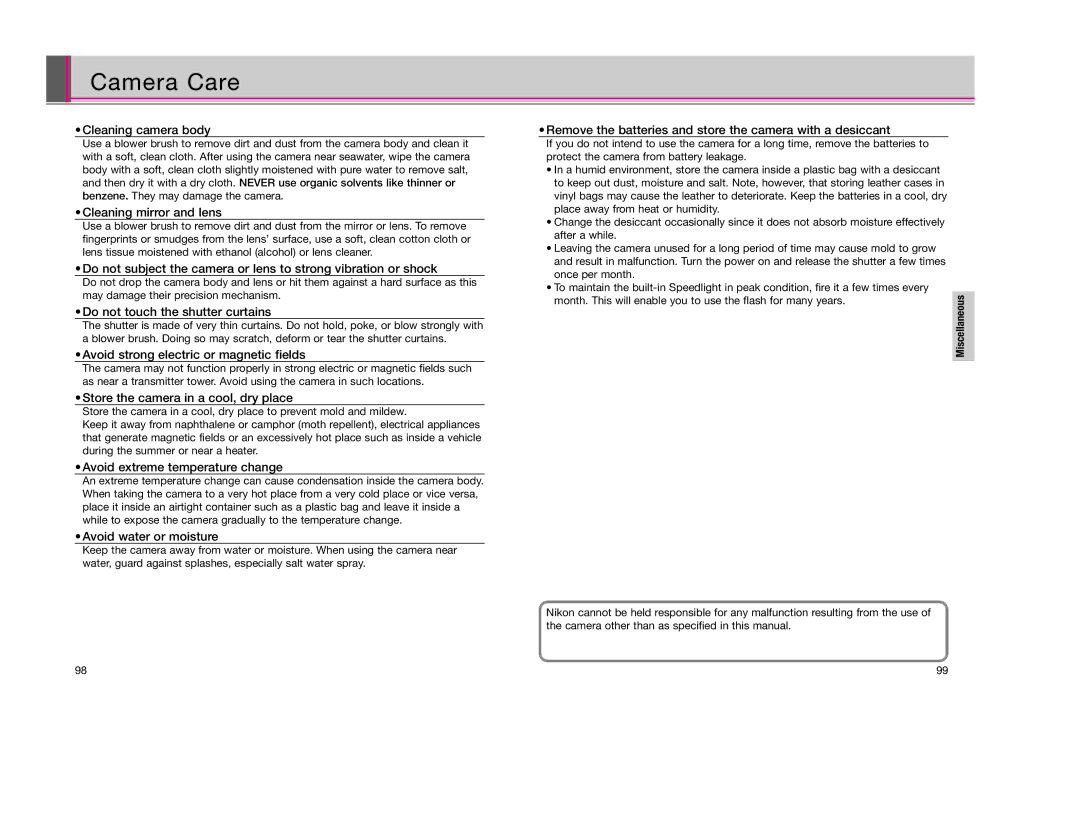
Camera Care
•Cleaning camera body
Use a blower brush to remove dirt and dust from the camera body and clean it with a soft, clean cloth. After using the camera near seawater, wipe the camera body with a soft, clean cloth slightly moistened with pure water to remove salt, and then dry it with a dry cloth. NEVER use organic solvents like thinner or benzene. They may damage the camera.
•Cleaning mirror and lens
Use a blower brush to remove dirt and dust from the mirror or lens. To remove fingerprints or smudges from the lens’ surface, use a soft, clean cotton cloth or lens tissue moistened with ethanol (alcohol) or lens cleaner.
•Do not subject the camera or lens to strong vibration or shock
Do not drop the camera body and lens or hit them against a hard surface as this may damage their precision mechanism.
•Do not touch the shutter curtains
The shutter is made of very thin curtains. Do not hold, poke, or blow strongly with a blower brush. Doing so may scratch, deform or tear the shutter curtains.
•Avoid strong electric or magnetic fields
The camera may not function properly in strong electric or magnetic fields such as near a transmitter tower. Avoid using the camera in such locations.
•Store the camera in a cool, dry place
Store the camera in a cool, dry place to prevent mold and mildew.
Keep it away from naphthalene or camphor (moth repellent), electrical appliances that generate magnetic fields or an excessively hot place such as inside a vehicle during the summer or near a heater.
•Avoid extreme temperature change
An extreme temperature change can cause condensation inside the camera body. When taking the camera to a very hot place from a very cold place or vice versa, place it inside an airtight container such as a plastic bag and leave it inside a while to expose the camera gradually to the temperature change.
•Avoid water or moisture
Keep the camera away from water or moisture. When using the camera near water, guard against splashes, especially salt water spray.
•Remove the batteries and store the camera with a desiccant
If you do not intend to use the camera for a long time, remove the batteries to protect the camera from battery leakage.
•In a humid environment, store the camera inside a plastic bag with a desiccant to keep out dust, moisture and salt. Note, however, that storing leather cases in vinyl bags may cause the leather to deteriorate. Keep the batteries in a cool, dry place away from heat or humidity.
•Change the desiccant occasionally since it does not absorb moisture effectively after a while.
•Leaving the camera unused for a long period of time may cause mold to grow and result in malfunction. Turn the power on and release the shutter a few times once per month.
•To maintain the
Nikon cannot be held responsible for any malfunction resulting from the use of the camera other than as specified in this manual.
Miscellaneous
98 | 99 |
